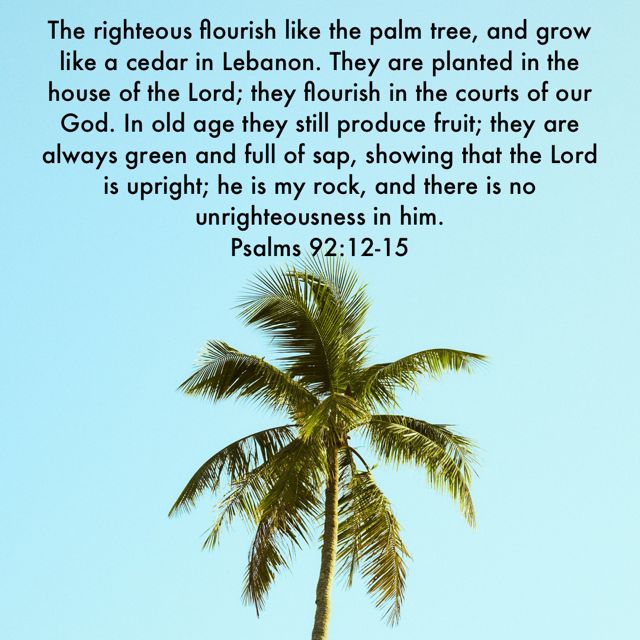THE SEED
“The righteous will flourish like a palm tree; they will grow like a cedar of Lebanon.” Psalm 92:12 NIV
King Nebuchadnezzar, threw the three Jewish men into a raging furnace because they refused to worship the king’s image. The king saw four men walking in the flames, with an additional person. He recognised the appearance of the fourth person “like the Son of God,” while the other three were kept safe. God delivered them, and the trial led to a promotion for them.A palm tree has some unique attributes, such as a source of nutrients for the tree being underneath the surface, and when there is fire the wood does not burn. Also, the fruit gets sweeter with age. Psalm 92 verses 14-15. They will still bear fruit in old age, they will stay fresh and green, proclaiming, “The Lord is upright; he is my Rock, and there is no wickedness in him.” These verses show that for a righteous person, you will continue to exist, and the Holy Spirit will sustain the life in you as He is deeply seated within you. You are thereby encouraged to hold on to God’s promises of “I will never leave you nor forsake you”. He will make you flourish despite the storms and turbulence your life may experience. Never give up because you will flourish, just like a palm tree wood does not burn, so also when you are in the midst of the fire, you will not perish- Isa 43:2. Your ability to continue living without being destroyed is because of the indwelling Holy Spirit. Be encouraged by the assurance that God is keeping His eyes on you, and He is by your side.
BIBLE READING: Daniel 3:16-28
PRAYER: By your power, Lord, cause me to remember the promise that You will not permit the righteous to be moved and that You will sustain me in every area and season of my life.
O DARA BI IGI OPE
IRUGBIN NAA
“Olódodo yóò gbile bí igi opẹ; wọn yóò dàgbà bí igi kedari ti Lẹbanoni.” Iwe Orin Dafidi 92:12
Nebukadinésárì Ọba sọ àwọn Júù mẹ́teeta náà sínú iná ìléru, torí pé wọ́n ko láti fori bale fun ère ọba. Ọba rí àwọn ọkùnrin mẹ́rin tí wọ́n ń rìn nínú iná, pelú ènìyàn mìíràn. Ó mọ ìrísí ẹni kẹrin “bí Ọmọ Ọlọ́run,” nígbà tí àwọn mẹ́ta yòókù wà láìséwu.” Ọlọ́run dá wọn nídè, àdánwò náà sì yọrí sí ìgbéga fún wọn. Igi opẹ ní àwọn àmuye kan tó ṣàrà oto, gẹ́gẹ́ bí orísun oúnjẹ fún igi tó wà lábẹ́ ile, nígbà tí iná bá sì wà, igi kì í jó. Pẹlupẹlu, eso naa n dun pẹlu ọjọ ori. Orin Dafidi 92 ẹsẹ 14-15. Wọn yóò sì so èso ní ọjọ́ ogbó, wọn yóò wà ní otun àti tútù, ní kíkéde, “Òdodo ni Olúwa; òun ni Àpáta mi, kò sì sí ìwà búburú nínú re.” Awọn ẹsẹ wọnyi fihan pe fun olododo, iwọ yoo tẹsiwaju lati wa laye, ati pe Ẹmi Mimọ yoo mu emi rẹ duro gege bi O ti n gbe ninu rẹ. Nípa bẹ́e, a gba ọ níyànjú láti di àwọn ìlérí Ọlọ́run mú, eyi tí o wipe; “Èmi kì yóò fi ọ́ síle tàbí koo síle láé”. Oun yoo jẹ ki o gbilẹ, bi o tile wu ki iji ati idojuko re Po to nile aye rẹ. Máṣe so ireti nu láé nítorí pé ìwọ yóò gbile gẹ́gẹ́ bí igi opẹ ti kì í jó, bẹ́e náà ni nígbà tí o bá wà ní àárín iná, ìwọ kì yóò ṣègbé – Aisaya 43:2. Agbara re lati maa gbe nile aye lai parun jẹ nitori ti Ẹmi Mimọ n gbe ninu re. Ní imulokan le nipasẹ idaniloju pe Ọlọrun n foju re so o ati pe O wa ni ẹgbẹ rẹ.
BIBELI KIKA: Dáníẹ́lì 3:16-28
ADURA: Nípa agbára rẹ, Olúwa, mumi rántí ìlérí re ti o wipe; ‘a ki yio si olódodo ní ipò’ àti pé ìwọ yóò gbé mi dúró ní gbogbo àgbègbè àti ní àkókò ìgbésí ayé mi.
